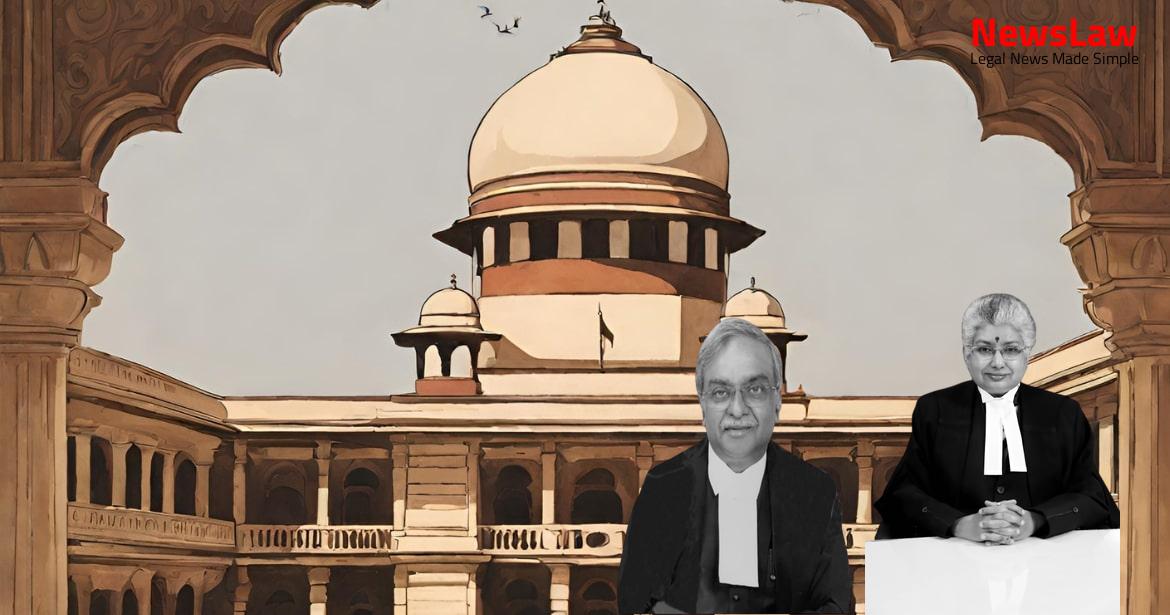Explore a significant legal ruling by the Supreme Court of India in the case of State of Punjab vs Ramesh Kumar regarding food adulteration standards. The Court’s decision sets a benchmark for adherence to prescribed standards and highlights the importance of upholding minimum sentences. Stay informed about this pivotal judgment impacting food safety regulations.
Facts
- Appellant was prosecuted and convicted for non-compliance with milk standards.
- Delay in analyzing the sample cannot be used as a defense as the sample was preserved.
- Sample of milk was collected on 30.10.1995 and analyzed for Milk Fat percentage and Milk Solid Non-Fat.
- Milk Solid Non-Fat was found to be 7.7%, below the prescribed standard of 8.5%.
- There is no evidence to suggest that the delay in testing caused the deviation in MSNF.
- Public Analyst received the sample on 02.11.1995 for further analysis.
Also Read: Enforcement of Foreign Award: Case of Oscar Investments Limited and RHC Holding Private Limited
Arguments
- Appellant was given the option to send the second sample to the CFL when the Magistrate took cognizance of the complaint.
- Courts have consistently found that the signatures on the documents are of the appellant and cannot be disputed.
- Various High Court judgments were quoted by the appellant’s counsel in support of their arguments.
- Appellant claimed to be illiterate and unable to sign, but courts confirmed the notice was duly served to him.
- Appellant argued that the option for CFL analysis was given late, but courts found this argument baseless.
- Court concluded that the appellant waived his right by not applying for CFL analysis of the second sample.
- Failure to file a list of witnesses did not impact the appellant’s right to send the second sample for CFL analysis.
- Quality of milk depends on food given to cattle and the health of cattle.
- Marginal deficiencies can be caused by natural factors beyond human control.
- Benefit of doubt should be given to the accused in cases of marginal variations from prescribed standards.
- Judgments cited by the counsel have been overruled.
- The proposition in Karunan’s case was deemed not good in law by a Division Bench of the Kerala High Court.
Also Read: Case of Eligibility for Disability Pension: Air Force Officer’s Retirement
Analysis
- Ram Kumar’s case (supra) relied on Ujagar Singh’s case (supra) to conclude the accused is not guilty of adulteration.
- A Division Bench of the Punjab and Haryana High Court in State of Punjab vs Ramesh Kumar held that Ujagar Singh’s case (supra) is no longer good in law.
- Reference was made to the Full Bench judgment in State of Punjab vs Teja Singh by the Division Bench.
- Quoting from Municipal Committee, Amritsar vs Hazara Singh, the Court took a similar view on the applicability of Ujagar Singh’s case (supra).
- Approval was given to the judgment of the Full Bench of the Kerala High Court in State of Kerala vs Parameswaran Pillai Vasudevan Nair.
- The judgment in M.V. Joshi vs M.U. Shimpi and Anr. was referred to for specific observations regarding acquittal.
- Under the Act, in cases of primary foods like milk, it is not necessary to prove that the item had become unfit for human consumption or injurious to health.
- Section 16(1)(a) of the Act mandates a minimum sentence of six months for non-compliance with food standards.
- Exercise of powers under Article 142 of the Constitution is not applicable as the incident took place over twenty years ago.
- The power under Article 142 cannot be used against specific provisions of the law.
- Standards laid down by the Legislature must be followed, and minimum sentences prescribed must be adhered to.
- Adulterated food items must be treated as such even if not immediately injurious to health.
- Power under Section 433 of Cr.PC can only be exercised by the appropriate Government.
- Judgments citing Section 433 in such cases are considered per incuriam and legally incorrect.
- Any deviation from prescribed standards, even marginal, cannot be overlooked.
- Passage of time cannot be a justification for awarding a sentence lower than the prescribed minimum.
- Article 142 cannot be used in total violation of the law; court can only recommend to the State Government.
- Courts cannot direct the Government to pass a formal compliance order; only the appropriate Government can do so.
- The critical question in such cases is whether the article complies with the laid-down standards or not.
- In the case of Santosh Kumar vs Municipal Corporation and Anr., the Court commuted a sentence of six months imprisonment under similar circumstances.
- The State Government was directed to pass formal orders of commutation in the Santosh Kumar case.
- Judgments in N. Sukumaran Nair vs. Food Inspector, Mavelikara and Santosh Kumar’s case did not discuss the scope and ambit of Section 433 of the Criminal Procedure Code, 1973.
- It is held that if the standards are not complied with, the Court is not justified in acquitting the accused charged with adulteration based solely on marginal deficiency.
- Article 142 should not be used to make a mockery of the law
- Article 142 powers cannot be misused to impose sentences lower than the minimum prescribed by law
- Using Article 142 in a food adulteration case to lower sentences would set a dangerous precedent for other serious crimes like murder and rape
Also Read: Judgment by Supreme Court On Man Singh vs. State of India
Decision
- The case has been dismissed due to lack of merit
- Any applications made are also dismissed
- Accused-appellant’s bail bonds are cancelled
- The accused-appellant is directed to surrender within four weeks
- The accused-appellant must undergo the remaining part of the sentence
Case Title: RAJ KUMAR Vs. THE STATE OF UTTAR PRADESH
Case Number: Crl.A. No.-001541-001541 / 2019



